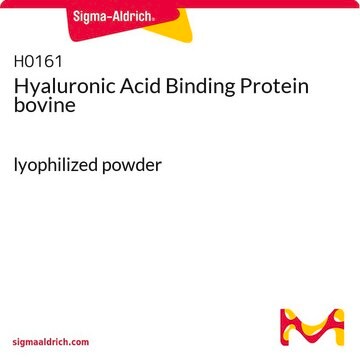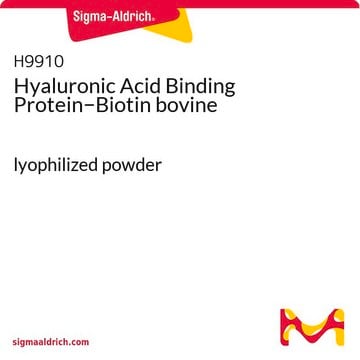H7630
Hyaluronic acid sodium salt from bovine vitreous humor
Synonyme(s) :
Poly(β-glucuronic acid-[1→3]-β-N-acetylglucosamine-[1→4]), alternating
About This Item
Produits recommandés
Source biologique
bovine (vitreous humor)
Niveau de qualité
Forme
powder
Couleur
white
Solubilité
water: ~5 g/L
Température de stockage
−20°C
InChI
1S/C28H44N2O23.Na/c1-5(33)29-9-18(11(35)7(3-31)47-25(9)46)49-28-17(41)15(39)20(22(53-28)24(44)45)51-26-10(30-6(2)34)19(12(36)8(4-32)48-26)50-27-16(40)13(37)14(38)21(52-27)23(42)43;/h7-22,25-28,31-32,35-41,46H,3-4H2,1-2H3,(H,29,33)(H,30,34)(H,42,43)(H,44,45);/q;+1/t7-,8-,9-,10-,11-,12-,13+,14+,15-,16-,17-,18-,19-,20+,21+,22+,25-,26+,27-,28-;/m1./s1
Clé InChI
YWIVKILSMZOHHF-QJZPQSOGSA-N
Vous recherchez des produits similaires ? Visite Guide de comparaison des produits
Application
- as a component for the generation of artificial synovial fluid
- to investigate its role in inducing oxidative stress and interleukin 8(IL-8) production in human nasal RPMI 2650 cells
- to test its effect on B cell proliferation
- as a substrate in neuraminidase assay of morbilliviruses virus
Actions biochimiques/physiologiques
Autres remarques
Code de la classe de stockage
11 - Combustible Solids
Classe de danger pour l'eau (WGK)
WGK 2
Point d'éclair (°F)
Not applicable
Point d'éclair (°C)
Not applicable
Équipement de protection individuelle
dust mask type N95 (US), Eyeshields, Gloves
Certificats d'analyse (COA)
Recherchez un Certificats d'analyse (COA) en saisissant le numéro de lot du produit. Les numéros de lot figurent sur l'étiquette du produit après les mots "Lot" ou "Batch".
Déjà en possession de ce produit ?
Retrouvez la documentation relative aux produits que vous avez récemment achetés dans la Bibliothèque de documents.
Les clients ont également consulté
Articles
Uncover more about glycosaminoglycans and proteoglycans including the structure of glycosaminoglycans (GAGs), the different types of GAGs, and their functions.
Uncover more about glycosaminoglycans and proteoglycans including the structure of glycosaminoglycans (GAGs), the different types of GAGs, and their functions.
Uncover more about glycosaminoglycans and proteoglycans including the structure of glycosaminoglycans (GAGs), the different types of GAGs, and their functions.
Uncover more about glycosaminoglycans and proteoglycans including the structure of glycosaminoglycans (GAGs), the different types of GAGs, and their functions.
Protocoles
To measure hyaluronidase activity, a turbidimetric determination assay is used at 600 nm. One unit of hyaluronidase activity will cause a change in absorbance of 0.330 per minute at pH 5.35 at 37 °C.
To measure hyaluronidase activity, a turbidimetric determination assay is used at 600 nm. One unit of hyaluronidase activity will cause a change in absorbance of 0.330 per minute at pH 5.35 at 37 °C.
To measure hyaluronidase activity, a turbidimetric determination assay is used at 600 nm. One unit of hyaluronidase activity will cause a change in absorbance of 0.330 per minute at pH 5.35 at 37 °C.
To measure hyaluronidase activity, a turbidimetric determination assay is used at 600 nm. One unit of hyaluronidase activity will cause a change in absorbance of 0.330 per minute at pH 5.35 at 37 °C.
Notre équipe de scientifiques dispose d'une expérience dans tous les secteurs de la recherche, notamment en sciences de la vie, science des matériaux, synthèse chimique, chromatographie, analyse et dans de nombreux autres domaines..
Contacter notre Service technique






